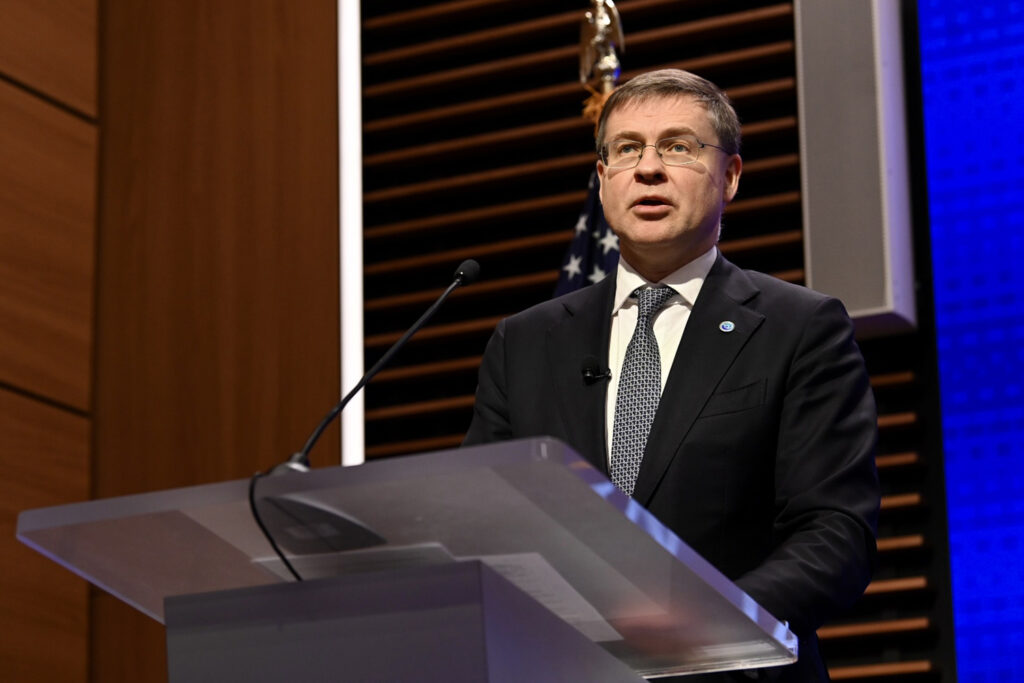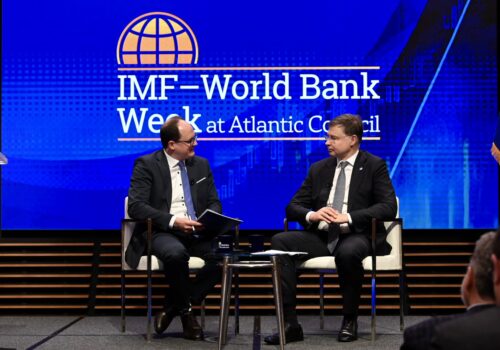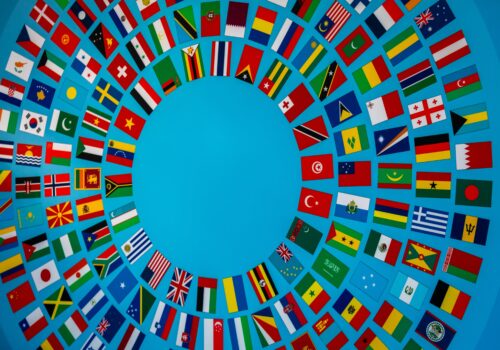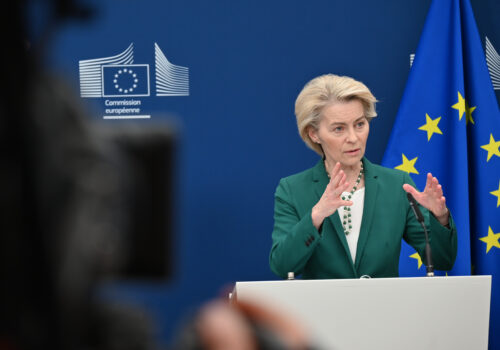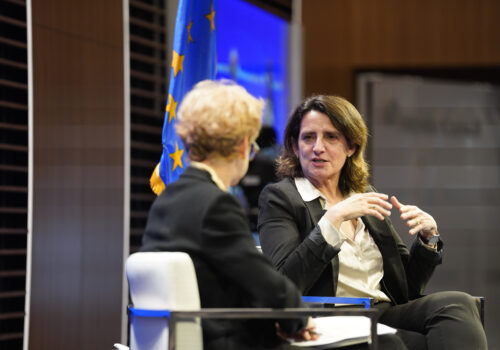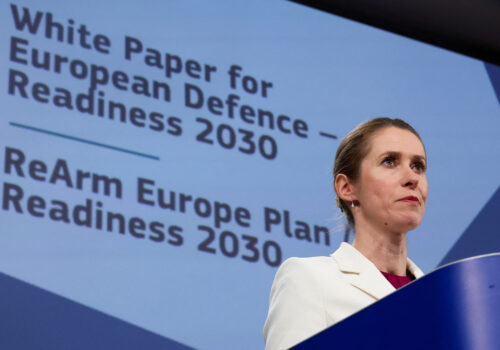Watch the full event
Speaker
Valdis Dombrovskis
Commissioner for Economy and Productivity, Implementation and Simplification, European Commission
Moderator
Jörn Fleck
Senior Director, Europe Center, Atlantic Council
Introductory remarks
Josh Lipsky
Chair of International Economics; Senior Director, GeoEconomics Center, Atlantic Council
Event transcript
Uncorrected transcript: Check against delivery
JOSH LIPSKY: Good morning, and welcome to day three of IMF-World Bank Week at the Atlantic Council. I am Josh Lipsky, chair of international economics at the Atlantic Council and senior director of the Atlantic Council’s GeoEconomics Center. And it is my pleasure to invite everyone to our live programming here from the Atlantic Council Global Headquarters in Washington, DC.
I have the privilege of welcoming you this morning to our conversation with European Commissioner for Economy and Productivity, Implementation and Simplification Valdis Dombrovskis. Commissioner Dombrovskis joins us as part of a special series of events during the IMF-World Bank Spring Meetings, and we’re very pleased to co-host today’s event with our Europe Center.
Throughout the week, we have been listening and learning from finance ministers and central bank governors from around the world on their priorities during this busy week in Washington. And there is no doubt the issue that is on the top of everyone’s minds: trade, tariffs, and the future of international economic coordination.
We all know these tariffs do not always discriminate between allies and adversaries. As IMF Managing Director Kristalina Georgieva noted in her curtain-raiser address last week, the resilience of the global economy is being tested by nothing short of a reboot of the global trading system. The US now has the highest effective tariff rate than at any point in the past century, and the cost to global growth was made clear in the IMF’s downgrades published yesterday.
But it was not as if there weren’t issues to address in the global economy before these tariffs were levied earlier this month. Macroeconomic imbalances, high public debt, strengthening productivity—these issues and challenges still confront the global economy in the weeks and months ahead and this is where the European Union has a critical and indispensable role to play.
As one of the largest markets in the world and a champion of a rules-based trading system, the EU’s voice is needed at this moment. As the United States’ largest trading partner with deeply intertwined supply chains, business ventures, two-way investments, it is a voice that carries enormous weight here in Washington and around the globe.
And we have the perfect guest to help us understand the EU’s stance at this moment of disruption. Commissioner Dombrovskis knows a thing or two about steady leadership and transatlantic economic relations during complicated times.
He has served as the economy commissioner since December 2024, his third post as a commissioner. He previously served as commission executive vice president for the economy, which also carried the trade file, during the previous European Commission mandate from 2019 to 2024, and as the commission vice president for the euro overseeing the bloc’s financial stability from 2016 to 2019.
In addition to his distinguished career in Brussels, Commissioner Dombrovskis also served as the prime minister of Latvia from 2009 to 2014. I will say that we have had the honor of hosting him before during the IMF World Bank’s Spring Meetings including in the sweltering heat of Marrakesh eighteen months ago. So it’s nice to have you in our cooler room today, Commissioner.
Commissioner, thank you for joining us once again at the Atlantic Council. We’re very much looking forward to your remarks and the conversation to follow with my colleague Jörn Fleck, senior director of the Atlantic Council’s Europe Center. But, first, Commissioner, the floor is yours.
VALDIS DOMBROVSKIS: Good morning, ladies and gentlemen. It’s good to be back amongst friends at the Atlantic Council.
You are all probably familiar with the old political adage never let a good crisis go to waste. A similar sentiment was once expressed by a founding father of the European Union. Jean Monnet famously said that Europe will be forged in crises and will be the sum of the solutions adopted for those crises, and he was right.
You see, when stakes are high Europe comes together and does whatever it takes to overcome crisis and emerge stronger, and the stakes could not be any higher today. Today’s extraordinary uncertainty presents Europe with challenges but also with opportunities.
The question is how the European Union can make the most out of those opportunities. So let me focus today on five opportunities that Europe is determined to seize.
First, using our predictability as strengths; second, getting our act together on security and defense; third, investing in our main economic asset, the single market of 450 million consumers; fourth, cutting red tape to boost our competitiveness; and fifth, expanding our network of partnerships across the world.
So, first, on predictability. We often hear that European Union is a large and slow ship which is hard to turn but, I would say, except in crisis when as the COVID-19 pandemic struck the European Union and its member states responded quickly, forcefully, and in a coordinated manner.
We rapidly put in place safety nets and support schemes to safeguard our economies and keep people in jobs. More recently, during the first year of Russia’s war of aggression against Ukraine President Putin threatened to freeze Europe to death.
In response we worked with member states and business communities to establish a joint purchasing platform for gas to ensure sufficient supplies. We adapted our infrastructure for alternative supplies and we committed to phasing out our dependency on Russian fossil fuels.
The US played a critical role here in this process, for which we are grateful. You see our fundamental values, individual liberties, democracy, and the rule of law is often painted as weakness by authoritarian regimes to prey upon. However, in times of turmoil, predictability, the rule of law, and willingness to uphold the rules-based international order become Europe’s greatest assets. We are committed to doing whatever it takes to defend our boring democracies, because boring brings certainty and a safe haven when a rules-based order is questioned elsewhere. Our processes allow for debates and consultations to take place, building buy-in from our key stakeholders and enabling us all to pull in the same direction.
This is what we are now doing on defense. My second point today is that European Union is now finally getting its act together on security and defense. President Trump is right in saying that Europe needs to take more responsibility for its security. At the 2014 NATO Wales summit, allies agreed to reverse the trend of declining defense budgets and aim towards achieving the NATO guideline of spending 2 percent of GDP on defense within a decade. Some European countries got serious about investing in their defense, but not all did. Today, as high-intensity war rages on our continent, there is a clear understanding that Europe can and must take greater responsibility for its security. It must carry its fair share of burden alongside its NATO allies, and United States in particular.
We are also committed to supporting Ukraine in its fight against Russian aggression until a just and lasting peace can be achieved. Ukraine is central to Europe’s security considerations. And it’s a vital part of Europe’s security shield, because Russia has a track record of open and hidden attacks on its neighbors: Moldova already in early 1990s, Georgia in 2008, Crimea and Donbas in 2014, and the whole of Ukraine in 2022. And Russia is not hiding its intention to launch an attack against European and NATO nations. This is a reality we face at Europe’s eastern flank. We cannot reward Russia for this kind of behavior. History taught us that demonstrating strength and determination is the best way to deter aggression. And we will do just that.
Last month, the European Commission presented the ReArm Europe Plan and Readiness 2030 Initiative to facilitate and encourage investment in our defense capabilities and defense industry. The package aims to unlock up to 800 billion euros in additional defense spending. This should allow defense spending in the EU to move from 2 percent to about 3 percent of GDP on average. Some nations, such as Poland and the Baltic states, are already above the 3 percent target and intend to increase their national defense spending further. And if needs be, we will commit even more. In addition to this, Germany has recently announced a 500-billion-euro package for infrastructure and defense investments. All this is a game changer for Europe’s security.
Of course, the EU should not only spend more but also spend better together. Our plan incentivizes EU member states to buy defense equipment together, promotes interoperability, ensures predictability for the order books, reduces costs, and creates a scale needed to strengthen Europe’s defense industrial base. And we remain open to participation and investment from our partner countries, under certain conditions. The European defense industrial base also includes Ukraine. At the great cost to the Ukrainian nation, its battlefields have also become a real time test laboratory for developing and refining innovative European and Ukrainian defense products.
Beyond enhancing Europe security, we expect that additional defense spending will bolster the international role of the euro, as we see a large market demand for euro-denominated safe assets. It must also boost competitiveness and economic growth, drive innovation, create new jobs, and help establish a common European market for defense.
Even more importantly, advanced technologies like AI and quantum computing cut across defense and security, and are foundational assets for our future competitiveness. Europe has fallen behind US and China when it comes to certain advanced technologies, and we are determined to catch up as a strategic priority.
This brings me to the third opportunity, the power of Europe’s single market as a strategic asset for European Union. US officials are right to emphasize that large and dynamic consumer markets are a source of great strength. And the EU is the largest of such markets in the West, home to 450 million people. Yet, when it comes to deepening the single market, we must shake ourselves from our complacency. Tearing down the remaining barriers would boost the EU’s competitiveness while attracting global talent and investment. It would also be beneficial for American companies already operating in the European market and for any firm or individual who wants to invest in market open to talent and trade.
We have already put some ambitious proposals on the table. We are integrating Europe’s capital markets to better channel our household savings, estimated at around ten trillion euros, towards productive investments. We are reducing Europe’s energy costs while decarbonizing our economies. We are investing heavily in strategies to develop the skills needed for future labor markets, including digital skills. We will propose a single set of rules for innovative companies to invest and operate in the single market. We will modernize our public procurement rules to take into account economic and national security considerations. We will make sure that our industrial and technological base is not wiped out by unfair competition, manufacturing overcapacities, or a shortage of critical imports. These actions, together with others we have planned, will help to reignite Europe’s economic dynamism and power a new era of productivity growth in Europe’s single market.
And we must tackle a longstanding problem of bureaucracy and red tape in the EU. This is my fourth point. I have been given the responsibility for driving and coordinating the European Commission’s work on cutting the red tape. We are on the journey to make our regulations smarter and governance simpler. We plan to intervene in a predictable, proportionate, and surgical way to alleviate the heaviest burdens.
We have set ambitious targets to reduce all administrative costs for companies by 25 percent, and by 35 percent for small- and medium-sized enterprises. This translates into cutting roughly 37.5 billion euros in annual administrative costs by the end of this European Commission’s mandate.
We have already presented the first two proposals to simplify EU rules in the fields of sustainability reporting, sustainability due diligence, taxonomy, and public investments. When fully adopted this package will bring, at conservative estimate, 6.3 billion euros in annual savings to businesses.
But this is just a start. We will continue our efforts across every policy area throughout the five years ahead. By doing so, we will make the EU a more attractive destination to invest, innovate, and to do business in, and a more attractive EU will be an economic powerhouse. Remember, we issue as many patents as the US. If we fully unleash our potential, Europe will be an important creator on next-generation technologies.
My fifth and final point is on our partnerships and trade. Let me start by that the European Union is not giving up on our closest, deepest, and most important partnership, with the United States. Our economic and trade relationship is estimated at $9.5 trillion. We are key trade and investment partners, as everyone in this audience knows. And we are also each other’s most important services trading partners, with our services trade estimated at $475 billion in 2024. And we will need each other even more in tomorrow’s increasingly conflictual and competitive world.
The EU stands by its existing partnerships and intends to deepen them, but will also seal new partnerships across the world to diversify and strengthen our economic security at home. The EU will remain an attractive, reliable, and predictable trading partner. We already have trade agreements in place with seventy-six countries. We have recently concluded negotiations with—for new or enhanced trade partnerships with Mercosur, Mexico, and Switzerland. We continue negotiations with India, Thailand, the Philippines, Indonesia, amongst others. Just a couple of weeks ago, we launched trade talks with the United Arab Emirates.
These trade agreements seek to establish win-win partnerships which are reliable and rules-based. Europe therefore remains open for business, investment, and trade. The EU has already made significant inroads to help shape new strands of global economy. For example, our new trade deals focus on digital partnerships, strategic investment in—strategic investment, or access to critical raw materials, or future sources of energy. As we speak, Europe is busy consolidating its stable network of partnerships that will act to lift all boats.
To conclude, ladies and gentlemen, Europe is determined not to let this crisis go to waste. The European Union will not sit back and content itself with reacting to unfolding events. We will actively seize opportunities emerging from the turmoil and offer our vision for a way forward. We are already seeing markets rewarding our predictability and efforts to get our act together. And we will deliver on these expectations. Thank you very much.
Explore all our IMF-World Bank Week programming
JÖRN FLECK: Well, thank you, Commissioner Dombrovskis, for your opening remarks, for setting out the EU’s approach to navigating these turbulent times by doubling down on its own strengths. And a warm welcome from me as well. Great to have you back here at the Council. We’ll try and dive deeper into each of those five opportunity areas that you set out. And if we have some time left, we’ll also try and bring in questions from the audience. But with little time, let’s dive right in.
You ended on global partnerships that the EU is driving forward. And in light of President Trump’s tariff threats and the impact on the global economy, those issues are obviously top of mind for everyone this week at the IMF and World Bank meetings. You also mentioned and made a commitment to the EU not giving up on its $9.5 trillion economic relationship with the United States, but we’re clearly in a highly volatile dynamic on transatlantic trade and investment. Given your experience, your prior portfolio managing and leading the EU’s trade policy, how do you judge the conversations with the US administration? The EU has put some offers on the table. And how hopeful are you that the United States and the EU can really come to a deal?
VALDIS DOMBROVSKIS: Well, indeed. Our first preference is clearly to come to the negotiated solution with US. And from our side we already came with some openings and indications, notably indicating our readiness to engage in buying more US LNG and strengthen our partnership in the area of energy. As regards industrial goods, coming with a proposal for zero for zero tariffs on industrial goods, indicating our openness also as regards industrial goods to work towards closer regulatory alignment and removal of non-trade barriers. Actually, we had during the previous administration a very useful format for this, the EU-US Trade and Technology Council. So we have also indicated our US counterparts that we would see useful to have this kind, or similar, format for our engagements also looking forward.
So we’re open to negotiate and we are open to seek mutually acceptable solutions. But at the same time, we have also clearly indicated that if those negotiations are not coming to the solutions we are also ready to come with counter-tariffs. We actually have already adopted our first package of counter-tariffs, worth twenty-one billion euros, but we suspended those counter-tariffs now for ninety days as the Trump administration at least partially have suspended so-called reciprocal tariffs so to give this time for negotiations.
JÖRN FLECK: There’s been a lot of reporting about trading partners of the United States walking away a little bit confused about what exactly the administration wants. So, with that, sort of can you comment at all whether you’ve gotten some signals in those conversations with the United States of where this might head?
VALDIS DOMBROVSKIS: Well, that’s exactly spot on because, indeed, we would welcome more clarity on the US side what are exactly the expectations and how we can arrive to the solutions without this imposition of additional tariffs. And already mentioned a couple of concrete openings from the EU side which we had suggested, but we so far also don’t have clear responses from the Trump administration side on those openings.
JÖRN FLECK: You spoke already in your answer about giving these negotiations a little bit of space and the EU pulling back on its initial retaliation or retaliatory tariffs. This morning we saw the European Commission announce fines against two US tech firms, Apple and Meta, for alleged violations of the—of Europe’s Digital Markets Act regulating platforms and competition policy. The Trump administration has made the EU’s digital regulation part of their rationale, their case for tariffs against the EU, as sort of non-tariff barriers in the administration’s argument. Are you at all concerned about the impact of those fines, the announcements now, on negotiations with the United States?
VALDIS DOMBROVSKIS: Well, we do not see the two issues as actually linked. So our Digital Markets Act is in place. It has to be followed by all large online platforms, be it European or foreign platforms, so it’s non-discriminatory in this regard. It also doesn’t have any extraterritorial effect; it only concerns the conduct of those companies in the respect of EU legislation for the EU customers. And since there have been some breaches found in case of Apple and Meta, the European Commission has levied the fines as regards to breaches of those DMA provisions, and the companies now have sixty days to address those breaches.
JÖRN FLECK: Allow me one last question on the trade policy side. You already hinted at this in your remarks and your speech. Josh Lipsky, our senior director of our GeoEconomics Center, called the administration’s approach an attempt to reboot the global trading system. We’re seeing a much more protectionist stance of the United States. And so, if tariffs and trade policy tensions are the new normal or are becoming the new normal, how are you expecting to deal with the overcapacity issues? How concerned are you about redirection of trade, especially from China, into the European Union, which is sort of the prime alternative destination in many ways? And more generally to your last opportunity area, how can the EU maintain its open trade stance, really, when there’s more protectionism, there’s also trade as a controversial domestic issue not just in the United States but also in Europe? We’re seeing that with the Mercosur negotiations. And so, in other words, can the—can the EU survive as the free trader—the lone free trader among a growing pack of protectionists?
VALDIS DOMBROVSKIS: Well, that’s why I was mentioning that EU has already the largest network of free trade agreements in the world. We currently have agreements with seventy-six countries. We are negotiating a number of new agreements. So I would say we are not the lone player committed to rules-based international trading system. And we seek is engagement with partners around the world to preserve this rules-based international trading system because we think that it’s serving the EU and the global economy well. So we see value in protecting it.
JÖRN FLECK: And on China and the redirection of overcapacity?
VALDIS DOMBROVSKIS: Yes. That, obviously, is a concern with US market now effectively closed to Chinese goods. The question is where all those goods will go, and given China’s industrial over capacities that’s a concern for the EU and we believe that’s a concern for many other countries.
So a lot will depend also on China’s behavior in this regard, if it will act as a responsible global player or will try now to dump all this over capacity on the EU or elsewhere.
In this case, obviously, we’ll help to protect our market against this overcapacity and against potential destructions in our market as, by the way, we recently did as regards Chinese battery electrical vehicles.
JÖRN FLECK: Turning to the EU’s economic outlook, the single market—doubling down on your own strengths, so to speak—we had the release of the IMF’s updated forecast yesterday downgrading growth by 0.2 percentage points to 0.8 percent in 2025. There was some discussion yesterday about given the massive reverberations throughout the global economy and stock, bond, and currency markets whether this is a little bit of a too rosy picture for the global forecast. For Europe how are you at the European Commission—how are your teams assessing the impact? Is that too rosy or are you confident that there are also spillover effects in terms of strengthening Europe—the euro—as a safe haven in uncertain times, which is the theme of your speech, in many ways?
VALDIS DOMBROVSKIS: Well, all in all we expect a negative economic effect on EU and even more so on US and also on global economy.
I will say, broadly consistent with also the IMF’s update, we’ll be updating our economic forecast next month so—but it’s clear that, all in all, it’s a negative effect. So we had done some simulations estimating the negative effect of Trump tariffs on EU economy in the range of 0.2 percent both this year and next. For US itself we expect negative effect of 0.8 percent this year, 1.6 percent next year. That is without further escalations and without retaliations from other trading partners which, obviously, cannot be excluded.
It’s worth noting it’s just, you know, simulations amidst huge uncertainty so but, say, all in all I think you—some idea on a scale of economic problem. For the world economy in the same scenario expect negative economic impact somewhere in the range 0.5-0.6 percent.
So but, indeed, crisis also comes with certain opportunities and, indeed, the EU being a stable and predictable partner we see interest from a number of other countries to engage with the EU in the trading sessions. We see renewed dynamics so it was also possible to conclude the EU-Mercosur agreement which, as you noted, was not easy on both sides, by the way.
But the Trump administration coming into office probably helped to concentrate minds in this regard. But also we see now stronger investor interest in Euro-denominated assets and, correspondingly, a stronger interest for the international role of the euro.
JÖRN FLECK: I want to come back to that first and ask you, though, about the competitiveness agenda at the European Union level and your portfolio, your role, plays such a key role in that respect. You mentioned in your—in your opening remarks some of the measures that the EU has already taken coming up to sort of half a year in this Commission’s mandate. What do you consider the biggest successes here? What specific measures on the competitiveness agenda would you like to see pushed forward, or you have in the pipeline? And you mentioned shaking off complacency, right, in your speech. Is this Commission being bold enough and swift enough in terms of driving forward measures on its competitiveness agenda?
VALDIS DOMBROVSKIS: Well, indeed, if you look at two overarching priorities of this European Commission, those are competitiveness and security and defense. And on this competitiveness, we already came forward with our broad strategy, Competitiveness Compass, outlining the directions of work for strengthening Europe’s competitiveness. And I touched upon them in my speech because that’s a broad range of factors—regaining and strengthening our positions in a number of strategic industries and strategic economic sectors, addressing high energy prices, addressing labor skills, including digital skills, obviously, addressing bureaucracy and cutting red tape, leveraging the strength of our single market, and so on and so forth. So it’s a whole range of issues we need to address to strengthen our competitiveness. But we are determined to do so. And also among EU member states there is a clear understanding and willingness to work seriously and address those issues.
JÖRN FLECK: As part of this you oversee the simplification agenda. Can you tell us a little bit more about that, and specifically what more measures we can expect? And whether you see also political consensus and political will behind that simplification agenda, because that’s a complex, interinstitutional, and member state agenda, obviously.
VALDIS DOMBROVSKIS: Well, yes. Indeed, on simplification, so we already put out our first packages of legislative proposals as regards sustainability reporting where we actually moved quite boldly: de-scoping some 80-85 percent of the companies for those sustainability reporting requirements, simplifying requirements for other companies, starting the review of European also sustainability reporting standards, in a view of simplifying them, and so on and so forth. So we already made quite strong first moves. There are more proposals in the pipeline. And next month we’ll be coming with a proposal to simplify EU’s common agricultural policy and also set up a new category of enterprises, small and mid-caps. So it’s a relevant alleviation for those small and mid-caps, also for more proportionate and simplified reporting requirements.
We’ll be later coming with the proposals on review of REACH, as regards chemical industry, on digital package. And all in all, in the European Commission’s this year’s work program, out of eighteen legislative proposals eleven will have to do with simplification. And we will continue the stress testing and assessing the EU legislative base, so called, acquis communautaire, in each area. And we’ll be coming with new simplification proposals throughout the entire European Commission’s mandate.
JÖRN FLECK: One last—
VALDIS DOMBROVSKIS: Oh, sorry. And on this agreement, I would say there is a broad agreement among EU member states. They were actually calling for European Commission to come with far-reaching simplification proposals. And already now there is agreement on so-called stop the clock proposals concerning two directives, corporate sustainability reporting directive and corporate sustainability due diligence directive. In a sense, avoiding further reporting requirements now being put on companies while the legislative process is ongoing. And those so-called stop the clock proposals are already adopted, so we have now time for a proper legislative process.
I would say things are more nuanced on the European Parliament side. There were—there are political groups which are, so to say, more cautious on this entire simplification agenda. So that will certainly require work with European Parliament. But we see that it’s also possible to move forward with European Parliament because it also came on board eventually on these stop the clock proposals and now is engaged in substantial discussions on our simplification agenda.
JÖRN FLECK: Thank you.
I’ll try and fit in two really quick questions. Please be very concise. Question mark at the end. Who wants to jump in? OK, over here and the lady in yellow.
Q: Hi. My name is Aaron. I’m a private equity associate in New York.
I wanted to ask, it seems that the Trump administration’s qualms with Europe are as much ideological as they are economic. And the kind of rhetoric we hear around shared values that we see in Europe is, frankly, absent from the Trump administration’s rhetoric. So how do you deal with the relationship when it seems like those kinds of overtures fall on deaf ears?
JÖRN FLECK: We’ll take them together, please.
Q: Terrific. Andrea Shalal with Reuters.
Commissioner Dombrovskis, I want to ask you about the fines on Meta and Apple again, and sort of drill in. So the timing is not—you know, is the timing coincident? And do you—do you seriously think that that kind of fine, especially given the strong relationship that exists between the Trump administration and the tech companies—including Apple and Meta specifically—does that send some kind of a signal about the EU’s willing—you know, defiance or decision to be resolute in terms of responding to what’s coming from the US right now?
JÖRN FLECK: Thank you.
VALDIS DOMBROVSKIS: Well, first of all, on shared values, I would say that we have a very long and very deep partnership which cuts across different levels of administration, society, people-to-people contact. So it’s not only administration to administration contacts. And I would say this deep alliance and understanding of shared values is there. Yes, we obviously have our differences with the Trump administration. As I said, from our side we are approaching them with open mind, and willing to find solutions. But I don’t think this should negate now our many decades of very strong partnership and being strategic allies.
Then the question on fines for Meta and Apple. Well, first of all, those investigations under Digital Markets Acts are, in a sense, running its own course and following its own logic. And the point is that all large online platforms when dealing with European consumers need to meet certain rules and obligations on protecting the user’s privacy, on possibilities also for smaller providers to compete fairly in the field which those platforms are providing. And those are the obligations which companies which are operating in Europe needs to meet, regardless of their incorporation—place of incorporation or controlling shareholders. So we do not see any reason to mix those investigations and finding of those investigations in our ongoing trade or other discussions.
JÖRN FLECK: Let me try and fit in one really quick question. You also oversee the Stability and Growth Pact and the European Semester, looking at compliance with the requirements of the Stability and Growth Pact. You spoke about Europe—a shift in Europe of Europe needing to spend more on defense, on infrastructure, on technology, and the green transition. At the same time, there’s not a lot of fiscal space for a lot of the member states. On that front, how do you see that balance between the requirement to spend more, but equally fiscal pressures on the member states and spending? And then on the defense side specifically, how happy are you with the incentives in the ReArm and SAFE, specifically, initiative to really get to joint procurement, joint projects on the defense side?
VALDIS DOMBROVSKIS: Well, first of all, obviously, there is always a difficult balance to find between our additional investment needs and fiscal sustainability considerations. But the fact remains that we have emerged from the previous two crises—from COVID-19 pandemic and from beginning of Russia’s war in Ukraine, with its disruption of supply chains and energy price shock—so we emerged from these crises already with elevated debt and deficit levels, so we need to address it. And that’s the purpose also of our new economic governance framework, how to allow member states to bring their debt-to-GDP ratios on downwards track while providing more flexibility for member states to choose their own fiscal adjustment trajectories.
Obviously, the latest developments on the Trump administration side and the clear understandings that Europe needs to take its security matters much more in its own hands because there’s clearly less commitment from Trump administration required us to act quickly. And that’s where this ReArm Europe Plan came in, providing additional flexibility under EU fiscal rules for EU member states. But it’s clearly framed, so it’s additional defense spending of up to 1.5 percent of GDP for a four years period starting this year. So allowing, first, member states to restock on their equipment and ammunition and so on, because many things have been sent to Ukraine; and also, allowing member states to transition towards structurally higher defense expenditure which will be necessary. So, and since we are clearly containing this proposal both in volume and time, we are also limiting its fiscal impact on—and impact on debt trajectories.
As regards the joint procurements, indeed, our SAFE Initiative—so 150 billion euros lending capacity, which we are now creating—is exactly there for EU member states to do, or some partner countries also to do, joint procurement of military equipment. And this whole ReArm Europe Initiative, which is focusing on financial part, is to be seen also in a context of our white paper on “Future of European Defence,” where we are planning how we actually will work much more together in this area of defense and security as European Union, ensuring also streamlining of our weapons systems, our interoperability, addressing a number of practical issues, closing our capability gaps, because defense is a new area for European Union. The European Union was not active in area of defense, but now in a context of war raging in European continent again, in a context of current geopolitical developments, it’s clear that EU will and is doing already much more on defense.
JÖRN FLECK: Well, that’s all we have time for, Commissioner. Thank you very much for joining us and covering such a wide range of issues. We wish you every success in your mission here in Washington, DC, and in your—with your mandate and your agenda back home in strengthening Europe and Europe’s global role.
With that, thank you very much to our audience here, to our audience online. Continue to watch the Atlantic Council’s coverage of IMF-World Bank Week at the Atlantic Council on our platforms, and look forward to seeing you for other discussions this week.
Thank you very much, Commissioner.
VALDIS DOMBROVSKIS: Thank you.
Watch the full event
Further reading
Tue, Apr 8, 2025
The EU could respond to Trump’s tariffs with a new ‘anti-coercion instrument.’ Here’s what to know.
New Atlanticist By
Confronted with the latest round of US tariffs, the European Union is considering a new but untested tool in its economic-security toolbox.
Thu, Apr 3, 2025
The European Commission’s Teresa Ribera: ‘We will defend’ Europeans in the face of new US tariffs
New Atlanticist By Katherine Golden
The United States' new sweeping tariffs are “bad news for the whole world—including Americans,” Ribera said at an Atlantic Council Front Page event.
Tue, Apr 1, 2025
The EU just released a roadmap to defend Europe. Will member states follow it?
New Atlanticist By Petr Tůma
To implement the European Commission’s defense readiness report, EU member states must make significant financial commitments and navigate the bloc’s political divisions.
Image: European Commissioner Valdis Dombrovskis speaks at an Atlantic Council event as part of IMF-World Bank Week on April 23, 2025.
